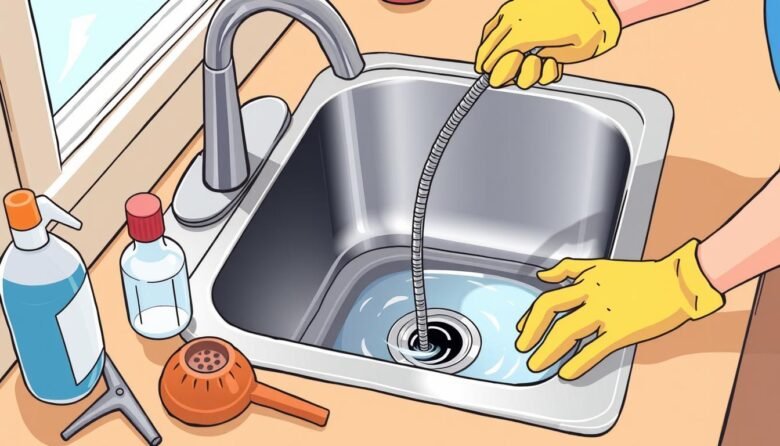Keeping your home’s plumbing system flowing smoothly starts with simple daily routines. Many common drain issues can be avoided with proper habits.
Understanding what causes problems is the first step. Kitchen and bathroom areas face different challenges.
Food scraps and grease can create serious plumbing problems. Hair and soap products often cause shower and bathroom drain clogs.
This guide offers practical tips for your entire household. You’ll learn effective ways to keep drains clear and prevent future issues.
Key Takeaways
- Simple daily routines can prevent most drain problems
- Different areas of your home require specific prevention methods
- Proper disposal of food waste and grease is crucial for kitchen sinks
- Regular cleaning helps avoid buildup in bathroom drains
- Household education prevents inappropriate items from entering drains
- Proactive maintenance reduces the need for emergency repairs
- Recognizing early warning signs helps address issues before they worsen
Understanding What Causes Drain Clogs in Your Home
Knowing the main offenders that block your household plumbing helps you avoid future headaches. Different areas face unique challenges that require specific attention.
Common Kitchen Clog Culprits
Grease poses a serious threat to your kitchen plumbing. It transforms from liquid to solid when cool, creating stubborn blockages.
Food scraps like pasta and rice absorb water and expand within pipes. Coffee grounds clump together instead of breaking down properly.
These materials gradually reduce drainage capacity. They eventually cause complete stoppages that require professional attention.
Bathroom Drain Enemies
Hair represents the number one bathroom drain enemy. It tangles around other debris and forms net-like structures.
Soap contains fats that leave filmy residue on pipe walls. This mixes with minerals to create hard soap scum buildup.
Personal care products often contain non-dissolving ingredients. These leave gunky accumulation in pipe bends and restrictions.
Toilet Clog Hazards
Non-flushable items create massive blockages in your toilet system. Wipes and paper towels don’t break down like regular toilet paper.
Feminine hygiene products expand significantly in water. They often become too large to pass through plumbing systems.
Small items like cotton swabs seem harmless but create complex tangles. These traps require professional intervention to resolve properly.
Essential Kitchen Sink Care Habits for Clog-Free Drains
Your kitchen serves as the heart of your home, but it also faces constant challenges to your plumbing. Implementing smart daily routines protects your investment and keeps everything flowing properly.
Start with thorough plate scraping before washing dishes. Remove all food residues into trash or compost bins before anything reaches your basin.
This simple step eliminates the primary source of kitchen drainage problems. It prevents food particles from entering your system entirely.
Proper Scraping Techniques Before Rinsing Dishes
Develop the habit of cleaning plates completely before they touch water. Use rubber scrapers to remove sticky foods effectively.
Pay special attention to sauces and gravies that contain fats. These materials contribute significantly to pipe restrictions when washed down.
Using Sink Strainers to Catch Food Debris Effectively
Install high-quality mesh strainers in all kitchen drain openings. These devices capture particles that might slip through during rinsing.
Empty collected debris into your trash receptacle regularly. This maintains optimal filtration performance and prevents overflow.
Fine mesh designs effectively trap coffee grounds and small food scraps. They provide excellent protection against accumulation in your pipes.
Safe Disposal Methods for Grease and Cooking Oils
Never pour grease down any drain in your home. Instead, collect used cooking oils in sealable containers.
Allow fats to solidify completely before disposal. Then place the entire container in your regular trash.
This method prevents liquid fats from coating pipe walls. It stops the formation of major blockages before they start.
Best Practices for Garbage Disposal Use and Maintenance
Understand that garbage disposals have specific limitations. Avoid placing grease, coffee grounds, or fibrous foods inside them.
Operate your unit with cold faucet water running continuously. This carries waste material fully through your drainage system.
Never put banana peels, eggshells, or potato skins in disposals. These items don’t grind effectively and can cause problems.
Hard materials like bones can break disposal blades completely. They often require professional repair when damaged.
For basins without disposals, commit to never allowing food scraps down drains. Use strainers as your primary protection against food-related issues.
Implement weekly hot water flushing routines for kitchen drains. Slowly pour boiling water down to melt accumulated fats and grease.
Bathroom Drain Maintenance to Prevent Clogging
Your bathroom presents unique challenges for your household plumbing. Implementing smart routines here protects your entire system from common issues.
Simple daily habits make a significant difference. They keep everything flowing properly without major effort.
Installing and Maintaining Drain Catchers for Hair Prevention
Hair represents the primary bathroom plumbing challenge. It tangles easily and creates stubborn blockages.
Install effective mesh catchers in all shower and tub drains. Choose designs that capture hair while allowing water flow.
Select appropriate mesh sizes for optimal performance. Easy-to-remove designs simplify regular cleaning.
These devices intercept hair before it enters your plumbing. They prevent the most common bathroom drain problems.
Regular Cleaning of Drain Stoppers and Removal of Buildup
Drain stoppers accumulate hair and soap residue quickly. This material slows drainage and causes complete blockages.
Establish a weekly cleaning routine for all stoppers. Remove them physically to clear accumulated debris.
Address bathroom sink issues proactively. Wipe up beard trimmings before they reach drains.
Schedule monthly maintenance for sink stoppers. Scrub away accumulated gunk and ensure proper function.
Proper Toilet Usage Habits to Avoid Plumbing Disasters
Toilets handle specific waste materials only. Flushing anything else creates serious system issues.
Use only toilet paper and human waste. Absolutely avoid wipes, tissues, and cotton swabs.
Feminine hygiene products expand significantly in water. They often become too large for plumbing systems.
Educate all household members about appropriate use. Emphasize that even “flushable” products cause problems.
Implement smart flushing techniques for families with children. Teach appropriate paper quantities and multiple flushes.
Rinsing Techniques to Wash Away Soap Residue After Use
Soap contains fats that leave filmy residue on surfaces. This mixes with minerals to create hard buildup.
Practice thorough rinsing after each sink and shower use. Run water for 30-60 seconds to wash away residue.
This removes toothpaste and beauty product films. Quick rinses significantly reduce soap scum accumulation.
Recognize that proper rinsing prevents hardened deposits. It keeps pipe diameters clear for optimal flow.
Proactive Pipe Maintenance and Clog Prevention Strategies
Moving beyond daily routines, implementing strategic approaches protects your entire household plumbing system. These methods address buildup before it becomes problematic.
Regular interventions keep everything flowing smoothly. They represent smart investments in your home’s infrastructure.
Weekly Hot Water Flushing Routines for Different Pipe Types
Boiling water treatments effectively dissolve accumulated materials in appropriate systems. Pour a full kettle slowly down drains weekly.
This method works wonders on grease and soap scum in metal pipes. Always check your plumbing materials first.
Avoid this technique for PVC pipes that can warp from extreme heat. Adapt your approach based on your specific setup.
Monthly Natural Cleaning Methods Using Baking Soda and Vinegar
Chemical-free solutions provide excellent cleaning without damaging your system. The baking soda and vinegar reaction works naturally.
Pour half a cup of baking soda followed by one cup of vinegar. Let the fizzy action work for thirty minutes.
Finish with hot water to rinse everything thoroughly. This monthly routine keeps drains fresh and clear.
Strategic Use of Drain Screens Across All Household Drains
Physical barriers stop problems before they enter your plumbing. Install appropriate screens in every drain throughout your home.
Choose proper sizes for kitchen and bathroom fixtures. Easy removal simplifies regular cleaning and maintenance.
These devices catch hair, food scraps, and other debris. They serve as your first line of defense.
Understanding What Never to Pour Down Your Drains
Certain substances cause immediate damage to your plumbing system. Paint, thinner, and chemical solvents create serious issues.
These materials can harm pipes and cause environmental concerns. Always dispose of them properly in the trash.
Avoid chemical cleaners that corrode pipes with frequent use. Natural methods prove safer for regular cleaning.
Even garbage disposals cannot handle grease or coffee grounds effectively. Understand their limitations to prevent problems.
Create a household list of prohibited items for reference. Educate all family members about proper disposal methods.
Establishing Effective Maintenance Routines for Long-Term Prevention
Building lasting drain protection requires establishing consistent household routines that everyone follows. These practices create a foundation for trouble-free plumbing that serves your family for years.
Creating Household Habits That Involve All Family Members
Develop comprehensive habits that include every household member. Education about proper drain use forms the cornerstone of effective prevention.
Assign regular maintenance responsibilities to different family members. Clear communication about clog prevention ensures everyone understands their role.
Create engaging teaching methods for children through interactive games. These activities help them learn what can and cannot go down drains.
Establishing these habits early creates lifelong proper plumbing practices. Family involvement makes maintenance easier and more effective.
Scheduling Professional Inspections and Septic Tank Maintenance
Schedule professional septic tank inspections every 2-3 years as experts recommend. More frequent checks may be needed based on local health regulations.
Arrange regular septic tank pumping by professional services. Base the frequency on household size and usage patterns.
This proactive approach prevents backups and maintains system efficiency. Professional care extends the life of your entire plumbing setup.
Incorporate monthly treatments with enzyme-based products like Drano® Max Build-Up Remover. These break down organic matter and prevent accumulation in septic systems.
Knowing When to Use Commercial Products Versus Natural Methods
Recognize appropriate times for commercial drain products versus natural approaches. Reserve chemical solutions for stubborn problems rather than routine care.
Maintain a supply of appropriate maintenance products for different needs. Drano® Kitchen Granules work well for basins without disposals.
Drano® Max Gel effectively handles units with garbage disposals. The Dual-Force Foamer addresses unpleasant odors when they occur.
Natural methods like baking soda and vinegar work for regular upkeep. Understanding when to escalate treatment prevents unnecessary chemical use.
Recognizing Early Warning Signs of Potential Clogs
Identify early warning signs before they become major issues. Slow drainage often indicates the beginning of a problem.
Listen for gurgling sounds that suggest air trapped in pipes. Unpleasant odors can signal buildup within your system.
Watch for water backing up in sinks or tubs during use. These signs require immediate attention to prevent complete blockages.
Develop a response plan that starts with natural treatment attempts. Progress to commercial products if necessary for persistent issues.
Call professionals when home methods don’t resolve the situation. Quick action saves money on emergency repairs and prevents extensive damage.
Maintaining Free-Flowing Drains Through Consistent Daily Habits
Simple daily routines create lasting protection for your home’s plumbing. These habits become automatic behaviors that keep drains clear and functional.
Every family member plays a role in preventing issues. Proper disposal of food scraps and coffee grounds in the trash makes a big difference.
Regular use of hot water flushing and natural cleaners like baking soda addresses buildup early. These methods work well for both kitchen and bathroom areas.
Consistent attention to your drain health saves money and avoids emergencies. Your household will enjoy trouble-free plumbing for years to come.



